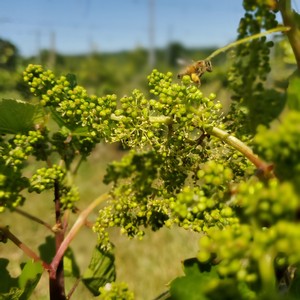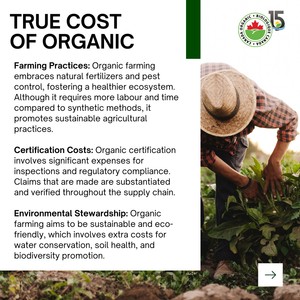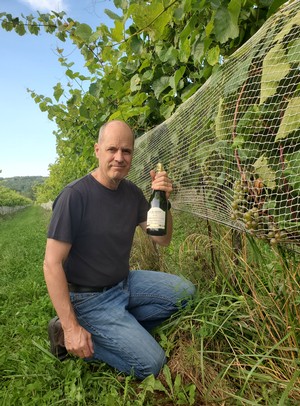L'Acadie Vineyards Blog
Welcome to the L'Acadie Vineyards blog and winery news
True Cost of Organic
True Cost of Organic

Beauty shot of L'Acadie Blanc in bloom photobombed by bee, 2024
Our Gaspereau vineyard has been organic from inception - 20 years next year since planting the first organic vineyard in Nova Scotia! Costs are substantial compared to conventional wineries but our drive comes from the heart and we wouldn't do it any other way. Here are some examples of the costs for organic wine,
Farming Practices
The organic approach is to manage a heathly living soil so that it provides for the vines. We brew plant-based grape pomace compost and horsetail teas, all from our property, to inoculate soil and protect leaves and clusters.
Pests are monitored and biodiversity is encouraged to attract natural predators with selected cover crops between rows, herbal plots of cilantro and dill, and natural forest.
Certification Costs
We have two levels of organic certifiication - producer (vineyard) and processor (winemaking). Both have rigorous inpections and audits including mass and traceability. The organic logo on every one of our bottles is the end result and shows our customers transparency and integrity.
Organic certification is required to be able to be certified to the Biocyclic Vegan International standard, an added level of sustainability that has costs such as sourcing organic cane sugar for sparkling tirage liqueur that has not been filtered through bone char. Their logo is on our bottles to show transparency of our vegan wine.
Environmental Stewardship
There are many pesticides available for conventional wineries that protect vines from within (systemic) and there are residues in wine and groundwater. Only naturally occuring contact inputs are allowable for organic and they can be costly.
The Canada Organic logo is 15 years old this year and Choose Canada Organic is celebrating. Our winemaker Bruce was on the working committee with other organic winemakers across Canada to decide on standards. Visit their site for more information.

Sustainable Wine - how far have we come?

How far have we come? Sustainable wine may sound like a buzzword created by corporate wine executives to sell more wine and give impressions that all wineries must already subscribe to the concept because it's repeated in marketing so much and seems attainable but there remains a large gap between wine producers. You’d think the wine industry would have progressed the most since the beginnings of the environmental movement in the 1960’s, their marketing is so visible, seductive and competitive. But like climate change, microplastics and bee colony collapse there continue to be issues that our society has been slow to understand and act on. Why aren’t we more advanced? The alarm sounding, environmental catalyst classic Silent Spring by Rachel Carson was published in 1961 and the culture at the time was that synthetic insecticides will save the world. Her dystopian outlook for the environment affected by these persistent chemicals such as DDT threatened that culture and she was attacked and muffled by stakeholders and the misinformed. Scenarios repeated time and time again for the last 60 years.
Wine, the beverage of ingredients. If mother nature doesn't provide during the growing season, well there’s an ingredient for that. And the range is great – Mega Purple for colour, potassium sorbate for stability, crushed chestnuts for more tannin, gelatin for less tannin, citric and tartaric acids for more acidity, potassium bicarbonate for less acidity, even ethanol for more alcohol, and water for less alcohol. There are animal inputs like egg whites, gelatin, milk protein, and synthetic inputs like PVPP (plastic) and a broad range of synthetic pesticides. I introduce vineyard inputs here because whatever is added to the vineyard ends up in your glass as residual chemicals. Similar to Silent Spring’s explanation of the relationship of aerial spraying DDT on Elm trees and the residue on leaves killing robins via earthworms. Many pesticides are systemic, they protect the vine from within by being absorbed into tissues, vascular system and berries, and even contact pesticides are absorbed into the plant, like our skin absorbs. Most provincial liquor boards require a pesticide residue analysis before listing a wine because there are limits set. Limits that are recognized to be safe doses, not carcinogenic. But pause here and think about the last 60 years and how we seem to have learned so little. The World Health Organization (WHO) classified Roundup, a too common glyphosate weed killer used in vineyards, as probable carcinogen but changed it to possible carcinogen in the 80's after chemical industry lobby pressures. It is now back to probable carcinogen.
Read Organic diets quickly reduce the amount of glyphosate in people's bodies
Raise your hand if you are interested in sustainability. In protecting our precious environment and your health, and your community’s health. Brock University recently conducted wine research: An Exploration of Consumer Perceptions of Sustainable Wine. Over 700 people surveyed.
“Consumers with high involvement in sustainable wines tend to be younger, better educated, more involved in wine in general, and spend more per bottle than those with low involvement.” Pickering, Best, 2023
“Results show that sustainability-related cues are somewhat valued by consumers when making purchase decisions, but have low importance relative to the other cues examined. Environmental dimensions of sustainability have high saliency, in contrast with social and economic dimensions, and a significant minority of respondents report no or very limited knowledge of sustainable wines.”
There is change happening and it is generational – millennials and Gen Z are leading consumers. In Europe the changes are most apparent. Spain’s Denomination of Origin Penedès in Catalunya (DO Penedès) recently announced an extensive roadmap up to 2030, taking into account sustainability and establishing the region as a high-quality wine producer in Spain. Most immediately, all grapes for DO Penedès wines must be from fully-certified organic vineyards by 2025.
Full article: DO Penedes Organic Wine Plans by Decanter
European government funding for vineyards is based on level of sustainability, with certified organic being king. And as noted, quality is a large motivator for this Spanish region. Climate change resilience is a benefit too with cover crops, diversity and minimal tillage protecting the soil.
The organic approach is only natural inputs into grape growing and winemaking with every step monitored for traceability and transparency by rigorous third party inspections. Biodiversity of cover crops between rows create habitats for predatory insects such as parasitic wasps and dragonflies and protects the surface of the soil so that soil fungi and earthworms can cycle nutrients to roots which helps sequester carbon in a uniquely living regenerative agriculture system. Living soils are the goal of organics and nurturing it with composted grape pomace teeming with fungi extends vine root zone influence by as much as 10 times with symbiotic fungal filament networks. Vegan viticulture excludes animal manures that can lessen living soils and cause pollution of underground water systems. Vegan certified producers extend this concept to winemaking with no animal inputs. A common ingredient is gelatin and this is made from slaughthouse waste. Other ingredients not allowed in organic winemaking include synthetic preservatives, irradiated and genetically modified ingredients.
I’m in! How to find organic wines. Read labels and find organic vegan wines here! In Canada, only organic wines from soil to glass can bear the Canada Organic logo on the label. Wines that are made from organic grapes but not organic winemaking can not have the organic logo because the treatment of the wine after growing is unknown, and the integrity of chain of custody of grapes that went into bottles is equally unknown. Certification to the Biocyclic Vegan Agriculture standard, based in Europe, ensures wines have no animal inputs from soil to glass. This has far reaching benefits to climate change mitigation and animal welfare.

Transparency and Sustainability: the benefits of choosing certified organic and vegan wines
Transparency and Sustainability: the benefits of choosing certified organic and vegan wines
Welcome to our blog! We are passionate about certified organic and Biocyclic Vegan wines, and committed to sustainability and transparency in everything we do. Discover why our award-winning wines are a must-try for health-conscious wine lovers.
Ingredients
Transparency is a cornerstone of certified organic and certified Biocyclic Vegan wines, backed by rigorous inspections of grape growing and winemaking, to inform you of what is not in your wine. The Canadian Organic Standard prohibits genetically modified ingredients, synthetic pesticides and synthetic fertilizers, and the Biocyclic Vegan International Standard prohibits animal inputs in the vineyard and winemaking. This effectively eliminates many common ingredients and since nutritional information and ingredient declarations are not required for wines, certified organic vegan wines are your only guarantee of what wasn’t added to them.
The certification logos on labels are your guide to choose wisely. You can also view our list of organic wines at our certifier’s site,

Health
Lower alcohol in cool climate wines offers a health advantage, another benefit of buying local. Add the health benefits of organic wines and you have a winning combination! You avoid synthetic pesticide residues - yes, every spray in the vineyard makes it into your glass, and preservatives such as potassium sorbate. Sulfite is naturally occurring, produced by yeast, and organic winemakers can only adjust sulfite levels to half the maximum in federal standards.
Alcohol and Wine - new Canadian alcohol consumption recommendations
Social Change and Environment
Biocyclic Vegan standards start in the vineyard compared to other vegan certifications that just focus on winemaking. These wines are vegan from soil to glass, and not using animal manures is a clear message to oppose conventional livestock practices. Composted grape pomace, left over after pressing, is alternatively used to create a humus-rich soil teeming with beneficial microbes - a living soil that supports vine health.
Cover crops and no-till practices, a pillar of organic agriculture, promote living soils and better nutrients, and mounting information indicates that carbon-holding benefits can lessen global warming.
Water and air quality benefits from organic practices are well proven. Nanotechnology is prohibited because these engineered substances in food and packaging can add to the problems of plastics in our water systems and our health..
~~In vino veritus
Alcohol and Wine
A new report from the Canadian Centre for Substance Use and Addiction has found that any more than two drinks a week is a health risk. This is sharply reduced from the past 10-15 drinks per week guideline.
https://www.cbc.ca/news/health/alcohol-cancer-risk-warning-1.6715769
This could lead to mandatory alcohol warnings on wine bottle labels, a good step towards transparency, and has me thinking of other label declarations that would benefit consumers.
I welcome transparency much like we are transparent with our organic wine and vegan wine traceability. Consumers have a right to know where their food is from, how it was produced and, yes, health risks involved. The responsibility has always been on organic producers to prove their integrity with inspections and audits, but shouldn’t non-organic farmers be required to provide a list of carcinogenic pesticides like Round-up, a widely used herbicide, recognized by WHO (World Health Organization) as a probable carcinogen. I have worked for large wineries and was always amazed seeing the same pesticides used in the vineyard always show up on the pesticide analysis of bottled wine.
Another level of transparency for consumers in GMO labelling. Genetically modified food does not have to be declared on labels in Canada or the USA, but are required in EU.
Will this new alcohol consumption report and possible label warnings affect wine sales? Wine is different than other alcoholic beverages and it’s possible that its alignment with food, lifestyle and moderation might give it more resilience. Nova Scotia wines in particular have lower alcohols than warmer wine regions – Tidal Bay, the region’s signature white blend, must be less that 11.0 % alcohol.
Give consumers information they need and let them make wise choices.
Is Wine Vegan?
Is wine vegan? Yes, all L'Acadie Vineyards wines are vegan and organic, and we also follow vegan viticulture. So what can makes other wines not vegan? We all know that wine is grown in the vineyard, that practices and weather can play a significant role in ultimate wine quality. So let's start there.
Vineyard management varies depending on varieties, vineyard location and philosophy. Our location is deeply rooted in Gaspereau, Nova Scotia and we grow several varieties - L'Acadie blanc, Leon Millot, Chardonnay, Sauvignon Blanc and Pinot Noir. Click here for more about our terroir. The latter varieties are in the vinifera family and are more sensitive to disease so require more attention. Strategies include hilling the trunks in winter, leaf removal next to clusters and shoot positioning for air circulation, periodic sulfur applications on the leaves and plant residue teas. That brings us to philosophy, which really has two camps - conventional and organic. We have been organic since first planting our estate in 2005/2006 and our nutrient management includes beet extracts for a nitrogen source rather than animal manure. Synthetic inputs are not allowed in organic systems and these include petroleum-based fertilizers, glyphosate weed killer, and a host of systemic and contact pesticides that ultimately make it into your wine.
Winemaking is the more direct source for non-vegan inputs. The most prevalent is gelatin, derived from animal slaughtering. It is a protein fining agent that is routinely added to hard press juices to reduce the bitter tannins that were squeezed from the skins. And there are other proteins used to similarly reduce bitterness and astringency in wines - egg whites for barrel aged reds, casein (cow milk) for correcting oxidized wine, and isinglass from fish bladders. So what do we use? Bentonite is a clay that has amazing clarification and stabilization benefits, and a riddling aid to help the yeast slide down the bottle for traditional method sparkling. For tannin management, we only make reds when the season gives us ripe tannins and phenolics(don't bother looking for 2018 and 2019 vintages), and after careful maceration techniques and aging in barrels we don't need to reduce astringency.
Organic winemaking is low intervention. And as Heather Rankin at Obladee Wine bar in Halifax said it once, "You have to know a lot to do a little". So very little inputs and essentially nudging the wine along its evolution path to become what it was meant to be in the vineyard, a wine with soul and transparency. Organic certifiers audit our grape sources and all our inputs, and the Canada Organic logo on our bottles is your assurance.
Join our organic wine clubs! Click here for more information
Traceability and Organic Wine
Do you know where the wine in your glass was grown? A winery can choose to use an appellation designation to give you validated information, and of course there is the required country of origin on the label, or wineries can simply share unverified vineyard sources on back labels. Much like appellation systems control a region’s wines, the Canadian Organic Standard controls organic wines and can be trusted to ensure the organic grape content in the bottle through rigorous inspections.
The Canada Organic symbol on a bottle of organic wine is controlled by the Canadian Food Inspection Agency and is the only validation to consumers of organic grapes, organic wine production and no GMO products – all inspected by a certifying body. The traceability audit is one of the many facets of an organic winery’s operations that are scrutinized on an annual basis. Record keeping has to be exemplary for the inspector to trace wines back to specific parcels of vineyards, and to ensure proper chain of custody and non-contamination. And each grower that supplies grapes must be organic themselves, providing a vital record for the wine audit. This traceability is one of the major foundations behind the organic symbol on the bottle.
Scrutiny in food production has steadily increased for food safety, sustainable efforts and consumer demand. The pandemic has intensified that consumer demand, with authenticity and local origin catapulting to the main stage. Traceability is becoming more important to wine drinkers to ensure authenticity and avoid counterfeit wines, a problem associated with high end prestige wines that is now creeping into lower price points. Solutions such as Blockchain, a transparent and secure record system that is most famous for Bitcoin transactions, are starting to be applied to build trust between wineries and consumers. Is the future QR codes on bottles that trace the wine right to the grape source? Perhaps, but right now consumers can trust a symbol that is transparent, validated and authentic and that is the Canada Organic symbol.

